
Article
Orwellian Surveillance of Vehicular Travels
Dartmouth Law Journal
(2015)
Abstract
In United States v. Jones, 132 S. Ct. 945 (2012), the State planted a tracking device on a vehicle to conduct surveillance on an individual’s travels twenty-four hours per day for twenty-eight days. The Court held that, because planting the device amounted to a physical trespass on private property, this amounted to a Fourth Amendment search under the historical ‘trespassory test’.
However, is it sensible to make the absence or presence of a trespass on a vehicle the dividing line between whether or not the Fourth Amendment affords constitutional protection against automobile surveillance? In other words, should the means used to accomplish the objective dictate whether or not the constitution has been violated? Is it not more prudent to make the underlying objective itself the subject of the Court’s constitutional analysis?
The purpose of this note is to answer a question that the Jones Court, and many courts nationwide, have either avoided or failed to reach a unanimous decision on – that is, do individuals possess a constitutional expectation of privacy that the State will not indiscriminately conduct prolonged mass surveillance of their automobile travels without first obtaining a valid search warrant?
Keywords
- fourth amendment,
- 4th amendment,
- tracking,
- gps,
- global position,
- monitor,
- privacy,
- invasion of privacy,
- big brother,
- orwellian,
- vehicular travels,
- automatic license plate recognition,
- alpr,
- surveillance
Disciplines
Publication Date
Spring 2015
Citation Information
13 Dartmouth L.J. 283